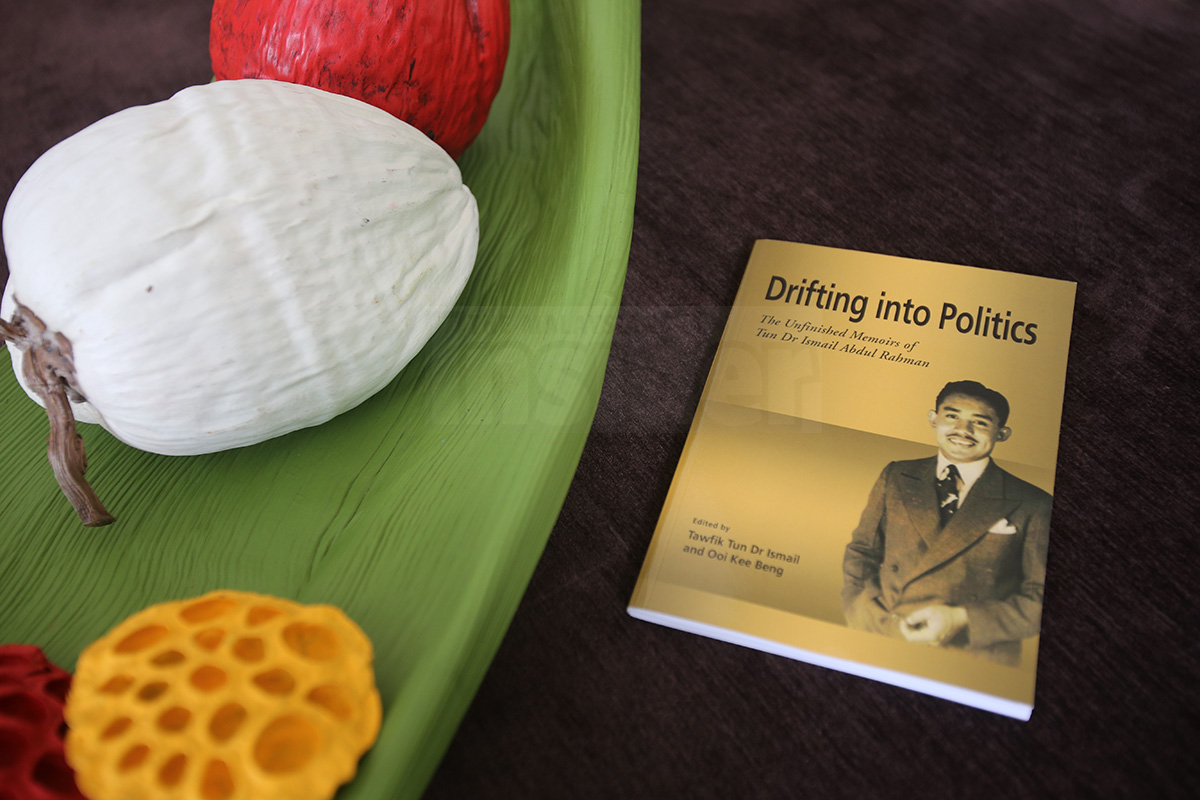 Drifting into Politics: The Unfinished Memoirs of Tun Dr Ismail Abdul Rahman is published this year to commemorate the 100th anniversary of the second deputy prime minister’s birth on November 4. – The Malaysian Insider pic by Kamal Ariffin, November 8, 2015.Drifting into Politics: The Unfinished Memoirs of Tun Dr Ismail Abdul Rahman
Drifting into Politics: The Unfinished Memoirs of Tun Dr Ismail Abdul Rahman is published this year to commemorate the 100th anniversary of the second deputy prime minister’s birth on November 4. – The Malaysian Insider pic by Kamal Ariffin, November 8, 2015.Drifting into Politics: The Unfinished Memoirs of Tun Dr Ismail Abdul Rahman
Edited by Tawfik Tun Dr Ismail and Ooi Kee Beng
Published by: ISEAS-Yusof Ishak Institute, Singapore; 2015; 89pp
This autobiographical narrative of the nation’s formative years by a leader who played a vital role in shaping the country’s future has an importance that is far larger than its slim size suggests.
Tun Dr Ismail’s account of his eventful life at the forefront of national events comes at an especially significant period in the Malaysian journey, when the national consciousness is undergoing great turmoil in the midst of a shifting political, social and economic landscape.
Although the publication of his memoirs comes more than 40 years after his untimely death from a heart attack, it retains a gripping quality today because we are experiencing the soul-searching and direction-seeking which a people undergo at the birth of nationhood.
Dr Ismail’s views on national issues will resonate strongly with current readers because he was grappling with questions about race relations, national consciousness and political challenges which continue to preoccupy us.
The core of the book covers 16 chapters in which he recounts his impressions from his childhood as a scion of an aristocratic Malay family in Johor during the British colonial era to his medical education in Singapore and Australia, the awakening of Malay nationalism, the struggle for independence, self-government and his service to the nation as a cabinet member.
Calls to publish Dr Ismail’s unfinished autobiography found among his papers had intensified since ISEAS brought out its first book on him, “The Reluctant Politician: Tun Dr Ismail and His Time” (2006), by the institute’s deputy director Ooi Kee Beng.
Dr Ismail’s family had asked for his memoirs to be published in 2015, to commemorate the 100th anniversary of his birth on November 4.
Although Dr Ismail’s life was cut short and he was never the prime minister, his relevance as a national figure can be appreciated even today.
The reason for this is distilled by Ooi, who co-edited this volume with Dr Ismail’s eldest son, Tawfik, in the introduction to the memoirs:
“His importance today, judging from the ways he is presently mentioned in speeches and articles, lies in his strong sense of fair play, his respect for ethnic diversity and his principled leadership. The need for these (is) amplified today by their increasing disappearance from the country’s political scene.”
“My own sense is that young – and old – Malaysians, in despair over the present situation of interethnic and interfaith intolerance, the arrogant mainstreaming of high-level corruption and the dismissal of the rule of law as the only means through which a multi-ethnic society can survive, look to best practices in governance accepted globally and seek some beacon from the country’s past which resonates with this aspiration.
“They find the latter in Tun Dr Ismail, among very few others.” – November 8, 2015.
* A fuller version of this book review can be found in Options, the lifestyle pullout of this week’s edition of The Edge Malaysia.

Comments
Please refrain from nicknames or comments of a racist, sexist, personal, vulgar or derogatory nature, or you may risk being blocked from commenting in our website. We encourage commenters to use their real names as their username. As comments are moderated, they may not appear immediately or even on the same day you posted them. We also reserve the right to delete off-topic comments